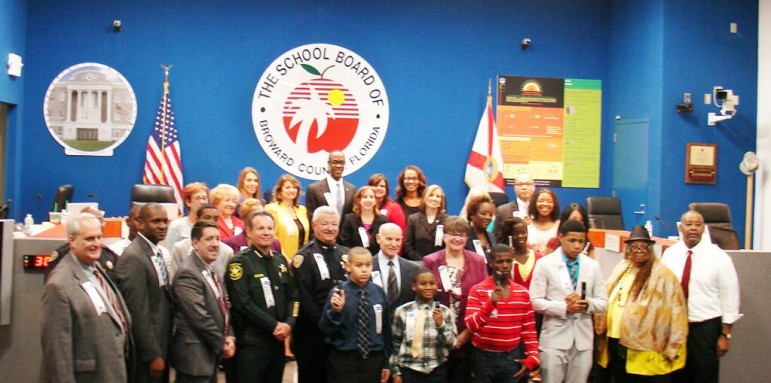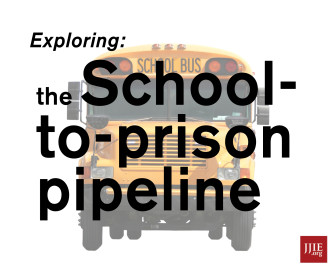
@browardschools / Twitter
School board members, Superintendent Robert W. Runcie, partners and students at the signing of the Collaborative Agreement on School Discipline.
South Florida’s Broward County School Board voted unanimously to sign new rules, written by many hands, which are meant to drive down arrests and their unintended consequences in the state’s second most populous school district.
The Nov. 5 Memorandum of Understanding approved by the school board has its signatories promise “appropriate responses and use of resources when responding to school-based misbehavior.”
Broward County School Superintendent Robert Runcie said the signing of the MOU was a historic day for ending the “schoolhouse to jailhouse pipeline”: school discipline practices that channel fairly inoffensive young people into the criminal justice system.
 “The agreement brings together district officials and community partners to create an alternative to failed zero-tolerance policies,” he tweeted just after the signing ceremony.
“The agreement brings together district officials and community partners to create an alternative to failed zero-tolerance policies,” he tweeted just after the signing ceremony.
It marks a “return to common sense” in school discipline, said Ft. Lauderdale NAACP branch President Marcia Ellison, who has been pushing for changes for years.
The document specifies how school administrators are to use the discipline matrix and recommends that first-time, low-level offenses be handled at school, even if their act meets the technical definition of a misdemeanor. It also directs all parties involved in discipline to consider a student’s age, history or other potentially mitigating factors.
The signers of the Broward document include the area’s state prosecutor and public defender, the chief judge of the Seventeenth Judicial Circuit, the Broward sheriff, the Ft. Lauderdale police and the state Department of Juvenile Justice.
“All different stakeholders at the table recognize that this is a problem,” said Ellison.
“You have to realize,” said Ellison, “that children who were exhibiting delinquent behavior … that behavior could have been running in the hallway, could be yelling in the cafeteria … could be scribbling on a wall, and that it would be referred to law enforcement.”
Learn more about school discipline reform trends at the Juvenile Justice Resource Hub HERE.
And in Florida, she added, that means a permanent arrest record that appears in background checks that employers, the military and others can order from the state.
Many school systems are already following a Broward-like disciplinary model, or are looking into something similar.
But what sets Broward apart is the very broad, deep and complete buy-in, said Alana Greer, a staff attorney with the Advancement Project, a Washington D.C.-based civil rights organization that supports the MOU principles and works on juvenile justice issues in several states.
“They changed the Code of Conduct, they created this agreement, they created an intervention program, all working together so that the programs and policies were all created to support one another,” said Greer.
“We’ve seen districts in places after many years of campaigns and work get to that place,” she said, but “we’ve never seen anyone do it in one move.”
She also said it’s rare to find people who see school discipline as a racial justice issue.
The Nov. 5 document says that youth of color are disproportionally arrested for the same schoolhouse antics as white youth, a pattern that’s been alleged or documented in other jurisdictions.
And in the 2011-2012 school year, Broward arrested more students on campus than any other Florida system: 1,062.
The new Code of Conduct has been in effect since this August. Arrests, suspensions and expulsions are each down by more than 40 percent compared to the same time last year, according to county data.
But in Florida, school boards control policy, so the discipline a child experiences still depends heavily on where he or she lives.
In Jacksonville, the Urban League announced last month that it and other community partners are forming a coalition to push for greater use of civil citations, rather than arrests, for certain juvenile offenses.
“The problem is that Florida is criminalizing youthful behavior,” said David Utter, the director of policy for Florida at the Southern Poverty Law Center, which is part of the Jacksonville coalition.
But the support he’s starting to see for civil citations is “an indication or acknowledgement that for thousands, if not tens of thousands of children arrested in Florida, it’s unnecessary,” said Utter.
In Florida, on-campus arrest rates for grades six through 12 vary by county, according to state numbers.
In the 2011-2012 school year, Broward County arrested eight of every 1,000 students. Dade, which includes Miami, tied for the lowest rate with rural Holmes County, at three out of every 1,000. The highest was rural Madison County, which arrested 50 of its 1,369 students, or, 3.7 percent of them.

Pingback: South Florida Squeezes School-to-Prison Pipeline | The Children's Campaign
I want to express praise for the leadership of Broward County schools, police, and courts and other advocates and citizens for stepping out to make this necessary change. There is a back room story about this leadership in Broward County you can read in an OP-Ed I wrote and published “Protecting School Campuses and Unintended Consequences” published earlier this year on January 16th. No matter how much technical assistance we give from Clayton, it’s meaningless without leaders with vision and courage to do the hard work. Great job Broward!